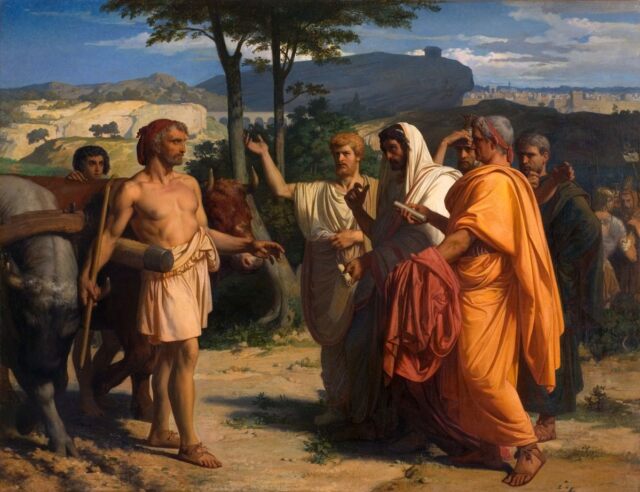Lucius Quinctius Cincinnatus (Lucius Quinctius Cincinnatus – “Curly”) lived in the 5th century BCE. He was a Roman patrician, consul in 460 BCE, who took the office of a dictator as a farmer.
Cincinnatus was opposed to attempts to raise the legal position of plebeians in Roman society. His son Caeso Quinctius, like his father, was an opponent of the commoners and tried to limit their rights. He often tried to depreciate the role of this stratum in the political life of the country, often against the legal order. In 461 BCE his actions, preventing plebeian tribunes from speaking at the Forum, were accused of breaking the Roman order. Caeso was released on bail and then fled to the Etruscans. He was then sentenced to death, and his father had to sell large tracts of land and concentrate on working on his small farm. Through their hard and arduous work, Cincinnatus and his family managed to feed themselves and survive the time of discomfort.
In 460 BCE Cincinnatus was proclaimed consul. While in office, his main opponent was the people’s tribune Gaius Terentilius Harsa, who, wanting to take advantage of the war between Rome and Wolskami, tried to push through reforms aimed at writing common law relating to patricians and plebeians. Political efforts to obtain such a code were to result in the writing of the Law of the Twelve Tables in the years 451-449 BCE.
In 458 BCE there were fights with the Ekwa and the Sabines. The Roman consul Minucius Esquilinus led the army against the opponents. However, she was surprised by the large Awareness forces in the Albanian Mountains, where she had to repel the siege. A few Roman horsemen escaped from the besieged city and made their way to the capital with information about the events at the front. The Senate panicked and decided to allow the second consul Horatius Pulvillus to appoint a dictator. He appointed Cincinnatus to the position for a term of six months.
According to legend, the Senate made a choice when Cincinnatus was ploughing the field. The deputies, sent by the Senate, first ordered him to put on a toga, and only when Cincinnatus appeared in the appropriate attire did they convey to him the news of the election. Cincinnatus then travelled to the city via the Tiber on a boat, supplied by senators. He was greeted on the shore by his three sons, most of the senators, and a few lictors who would accompany and protect him.
It is worth those persons’ while to listen, who despise all things human in comparison with riches, and who suppose that there i no room for exalted honour, nor for virtue, unless where riches abound in great profusion. Lucius Quintius, the sole hope of the Roman people, cultivated a farm of four acres, at the other side of the Tiber, which are called the Quintian meadows, opposite to the very place where the dock-yard now is. There, whether leaning on a stake in a ditch which he was digging, or in the employment of ploughing, engaged at least on some rural work, as is certain, after mutual salutations had passed, being requested by the ambassadors to put on his gown, and listen to the commands of the senate, (with wishes) that it might be happy both to him and to the commonwealth, being astonished, and asking frequently “whether all was safe,” he bids his wife Racilia immediately to bring his toga from his hut. As soon as he put this on and came forward, after first wiping off the dust and sweat, the ambassadors, congratulating him, unite in saluting him as dictator: they call him into the city; explain to him what terror now exists in the army.
– Titus Livius, Ab urbe condita, III.26
The next morning Cincinnatus entered the Forum Romanum and nominated magister equitum (in the absence of the dictator, magister equitum would replace him and had the same powers) Lucius Tarquitius, who was considered one of the best soldiers of Rome. Then he went to the deliberations of the people’s assembly and gave the order to mobilize all men capable of fighting and gather them on the Field of Mars. With an army ready, he set out from the city towards the Aequi, with whom he fought in the Battle of Mons Algidus. Cincinnatus personally led the infantry while his deputy Tarquitius commanded the cavalry. The attack from both sides surprised the Aequas, who suffered a severe defeat. The Aequi sent a special message asking them not to murder the prisoners. Cincinnatus, wanting to avoid unnecessary bloodshed, agreed to the terms on the condition that they would provide him with their leader Gracchus Cloelius and his officers in chains. The Romans created a special yoke made of three spears, two of which were driven upright in the ground, and the third was tied crosswise at the top. Defeated without armour or weapons, they had to pass deeply bent under it, or even crawl. It was a typical Roman punishment on a defeated enemy, aimed at degrading and dishonouring dignity.
After his victory over the Aequi, Sabines and Volsci and the triumph, Cincinnatus immediately relinquished his office and associated unlimited power to return to farming. As a result, he became a symbol of the virtues of a Roman citizen, especially among the Roman aristocracy, who considered him a hero of early Rome.
Cincinnatus was a re-dictator in 439 BCE when he had to suppress the conspiracy of Spurius Maelius, who was probably planning to become king of Rome. Cincinnatus was appointed by his old friend and family member, Titus Quinctius Capitolinus Barbatus, consul of 439 BCE.
Cincinnatus has been invoked many times as a model of civic virtue. His achievements were described by the Roman historian Titus Livius, and thanks to him Cincinnatus turned out to be one of the most popular figures of Roman antiquity known to literature and historiography of the European modern era.



